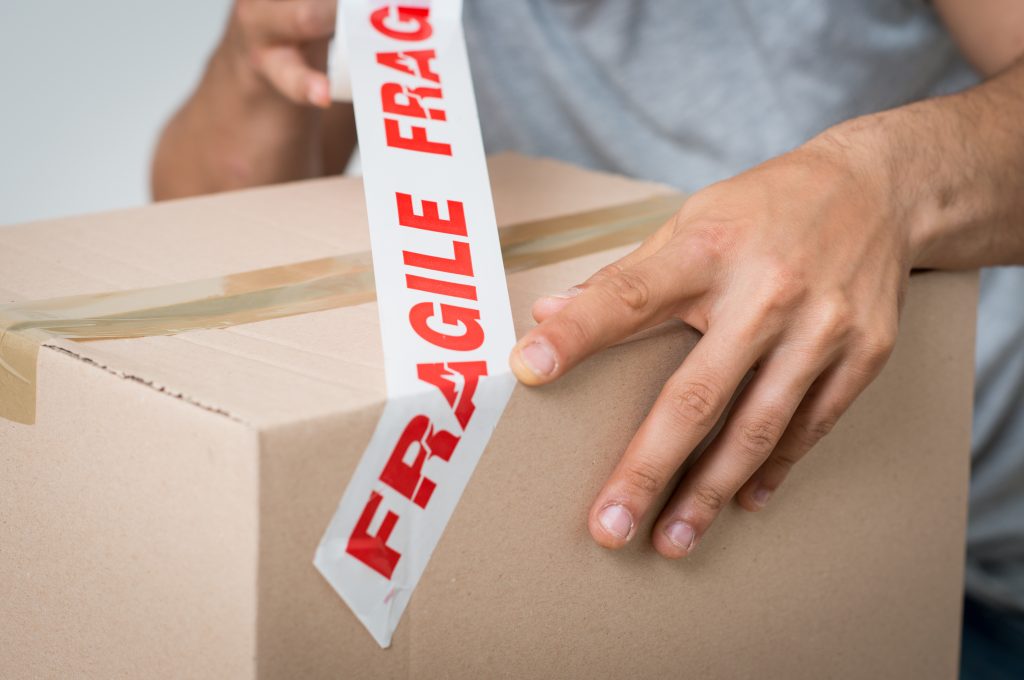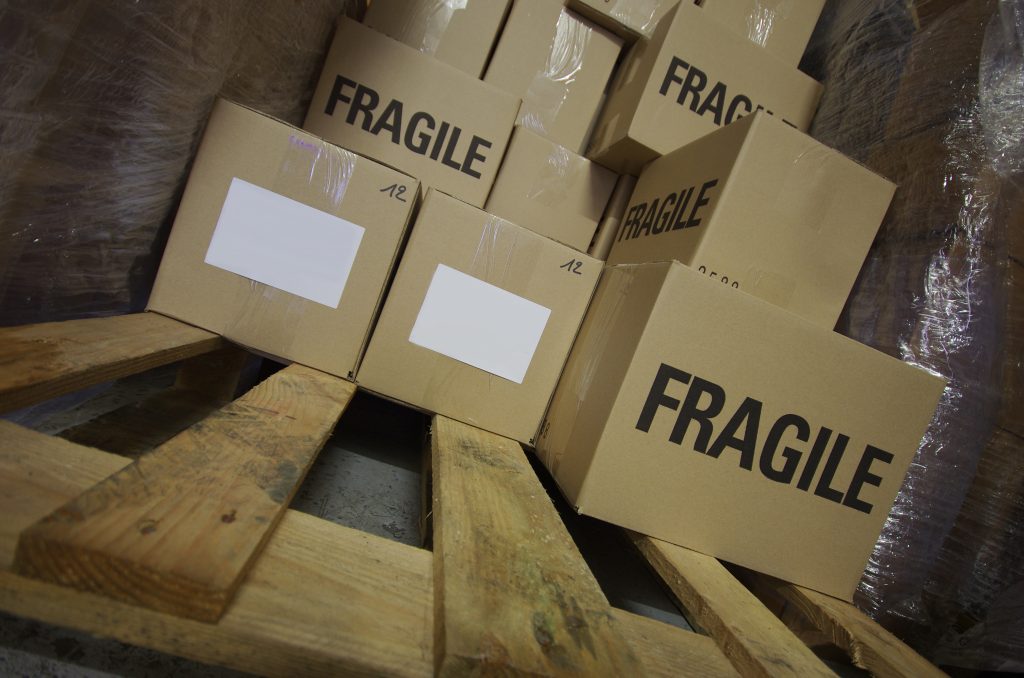April 26, 2023

If you frequently ship fragile freight, you’ve undoubtedly encountered your fair share of shipping hurdles, including delivery delays and product damage.
While occasional fragile freight shipping issues are unavoidable, you can significantly reduce the frequency of these challenges and protect your fragile freight by using less-than-truckload (LTL) shipping.
Let’s take a closer look at LTL shipping and the benefits it provides when dealing with fragile freight.
LTL shipping involves shipping freight that doesn’t fill up an entire trailer. In this case, your goods only occupy a portion of the trailer — the rest is filled with pallets from other LTL clients, each of which pays for space based on the dimensions of their products.
LTL shipping is an economical and efficient way to ship smaller loads. You can arrange more frequent shipments instead of reserving an entire trailer.
LTL shipping provides numerous benefits for merchants that need to ship fragile freight. You can tap into these benefits to fuel business growth and support back-end supply chain and delivery processes.
For example, LTL shipping:
Reserving an entire 48 or 53-foot trailer can be cost-prohibitive, especially if your load isn’t large enough to take up the entire trailer. Requesting specialized handling for your fragile freight will drive up costs even more.
Since LTL shipping involves using only a small segment of a trailer, you’ll enjoy much lower freight fees. As a bonus, many carriers offer discounted specialized handling rates because they aren’t dealing with a bulk order of hazardous or fragile goods.
Waiting until you can fill an entire trailer is impractical, especially if you run a small business. By the time you need a dedicated trailer, downstream distribution centers will be running low on inventory.
LTL shipping resolves this problem by enabling you to ship small quantities of goods. By increasing shipping frequency, you can prevent stockouts and expedite delivery times. This translates to more sales and happier customers.
LTL shipping can provide additional protection for your fragile freight. Reputable LTL carriers carefully handle your tightly packaged pallet to ensure that they don’t accidentally damage your fragile goods.
When preparing your freight for pickup, make sure it’s securely wrapped and packaged. It’s also a good idea to mark it as “fragile” or “breakable” so everyone knows it requires special handling.

Even though your freight will be lumped together with several other shipments, you’ll still be able to track its progress through the supply chain. Your LTL fragile freight will be handled and marked at various points of transit. You’ll receive an update about its status and location during each checkpoint.
Leading LTL carriers may even offer real-time tracking capabilities. They do so by using RFID and/or GPS technologies to relay location updates to a client portal. Such conveniences make it easy to keep up with your shipments. All you have to do is log in and provide your assigned tracking number to see if your order is on schedule.

Despite a carrier’s best efforts, handling or delivery exceptions can still occur. A delivery exception is when your shipment is unexpectedly delayed due to poor weather, customs holds, etc.
Working with an LTL carrier makes handling exceptions easier, as only a small quantity of your products will be on the trailer that’s delayed. As such, you’ll have more options for responding to the delivery issue.
For instance, in the event of a prolonged delay, you can arrange a secondary LTL shipment to maintain seamless operations and minimize the impact on your customers.
Intrigued by the benefits of LTL shipping and ready to incorporate it into your logistics strategy? If so, there are two ways that you can start using LTL shipping.
The first approach involves doing your own research and finding LTL shippers in your area. Alternatively, you can work with a third-party logistics provider (3PL), like R2, and let them handle everything. A great 3PL will negotiate rates, schedule pickups, and address exceptions or other issues with your deliveries.
Contact R2 today to get started.
Input your search keywords and press Enter.
Along with our other available capabilities, R2 also offers your business intermodal services. If you would like to utilize this service or explore its options, our experienced staff can assist you in taking advantage of its possibilities. Let us help you find the most efficient and manageable cost for your shipment.
Intermodal Freight Benefits
– R2 associates are on hand 24/7 to assist in any matter
– We can accommodate cost effective solutions for any number of loads you may have
– Watch your shipment move from Point A to Point B online
– Multimodal transition is done seamlessly as your needs alter
– A contracted capacity with the ability to move your freight in the U.S., Canada, and Mexico
As supply chain complexity is in constant evolution, ingenuity is vital for gaining a competitive edge. Our expert associates provide the ability to appraise your logistics network to expand and apply more cost effective and service oriented solutions. Do you have just one requirement or several? The R2 team is only a phone call away to help position your company above the competition
R2’s Managed Transportation Program Includes:
– Collaboration – your business is our business. We will aid in the arrangement of meeting your supply chain demands with corporate guidelines
– Evaluation of your distribution system and design of the most cost effective network
– Providing transportation direction to bring control to your shipping budget and improving response time
With R2 Logistics’ excess of contracted carriers, the options are endless to find the right solution to move your freight. We also understand that getting it moved isn’t your only concern. That’s why it’s our first priority to choose the right option for you.
After the selection has been made we begin the process of following the freight from start to finish. At least 5 check calls are made for each shipment to ensure its security, and if you ever have a question, we’ll have an answer.
Truckload Freight Benefits
– We’re committed to you and your business – we’re available 24/7
– We set you up with your ONE and ONLY account representative
– We are not bound by U.S. borders – we make it easy for you to move shipments to and from Mexico and Canada
– Follow your shipments quickly and easily online
– Countless options – whether it’s for one load or for your entire supply chain, R2 has the solution you’re seeking
Knowing when to use Less Than Truckload shipments increases productivity, reduces freight spend, and streamlines freight shipping. LTL is ideal when freight doesn’t require the use of an entire trailer and weighs between 150 and 15,000 pounds.
Our relationships with the nation’s leading LTL carriers, allows R2 to pass our rates to our customers. Beyond our competitive rates, we have simplified the LTL shipping process with our innovative and game-changing Transportation Management System.
Using our TMS, shippers can realize the rewards from the moment they log on. With R2’s cloud-based TMS, shippers have access to real-time pricing, capacity across multiple carriers, and actionable reporting analysis.
LTL Freight Benefits with R29
– Analyze your logistics network and improve its current state
– Competitive rates pre-negotiated with our network of LTL carriers
– Ability to instantly quote, book, track and manage all shipments with R2 TMS
– A dedicated LTL freight expert to help with any of your freight questions
– Consolidated invoicing for all your shipments
– Unparalleled reporting capabilities making performance and cost analysis simpler than ever
We can understand that there’s never enough time in the day. If you have a shipment that should have been moved 24 hours ago we have the means of getting it there now. We have a multitude of contracted expedited and air freight carriers who can move your freight for you in a safe and reliable fashion. Let us do the work for you. We will track the shipment and let you know when it has arrived at its destination.
Expedited and Air Freight Benefits
– Dedicated dispatch and freight management from all R2 associates
– Extra precaution and 24/7 supervision for sensitive shipments
– ONE point of contact to answer any and every need you may have
– Customized options allowing you to utilize the best combination of service and value
– Accessibility to a surplus of different vehicle or trailer types as well as single and team driver
With a wide range of Ocean Freight services covering multiple equipment types and consolidation services, we ensure your cargo reaches its destination in the most cost-efficient manner. Our long-term relationships with ocean carriers allows R2 Logistics to provide both Less-Than-Container Load (LCL) and Full-Container Load (FCL) shipments. Our in-house team of international freight specialists manage your freight and also offer customs clearance and tariff classification.
R2’s Ocean Shipping Benefits
– Competitive rates pre-negotiated with our network of ocean carriers
– Use FCL shipping for valuable cargo that you wouldn’t want with another person’s shipment. FCL is also a good option if you need to ship loads of 12+ pallets
– LCL shipping means you share container space with other cargo. This can be a more cost-effective option for shipping smaller loads overseas.
– The ease of working with one company for all your logistics needs—including ocean, air, customs brokerage, trade compliance, and surface transportation
Simply put, Reverse Logistics is the return of products to a manufacturer or distributor from their customer. A well-organized Reverse Logistics program will result in direct benefits such as improved customer satisfaction and reductions in warehousing and distribution costs. Studies show 8-9% of all customer shipments are returned and 25-30% of e-retail shipments are as well. Managing Reverse Logistics costs are critical to running an efficient Supply Chain.
RA Numbers & Accounting
RA numbers are captured in the R2 TMS and linked with BOL numbers and Carrier PRO numbers resolving accounting issues due to missing RA numbers.
Damage & Recouping
Strong relationships with R2’s network of LTL carriers ensures shipments are handled with care.
Cost
The R2 TMS will select the most effective carrier for both transit time and cost. Customers are no longer held “hostage” with only one carrier choice.
When you’re hauling a shipment that’s oversized and overweight, attention to detail is crucial. The attention needed is exactly what you will receive with R2. With our vast network of nationwide carriers we can solve the problems you may face with your specialized shipment. Safety always plays a major role in any shipment moved under our watchful eyes. This makes us the easy choice for your next shipment requiring special handling.
Flatbed & Specialized Freight Benefits
– 24/7 dispatch supervision from start to finish
– Guaranteed certified and insured carriers used for every load
– ONE account executive available for any assistance needed
– Online tracking and document retrieval capability
– Shipping solutions designed to meet your unique needs